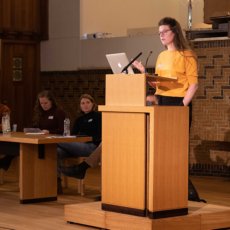
- Coping with crisis and the negotiation of identity in Jewish antiquity
- Contextuality and the crisis of Biblical studies
- Ecological awareness arising from encountering the Bible
- The earth is the Lord’s: Renewing Christian theology from the ground up in times of crisis
- Competing Christianities: violence, ideology and war in Europe and beyond
- Obtaining the ‘good’ in a context of pluralism
- Home
- Education
- Courses online
- Contextuality and the crisis of Biblical studies
Contextuality and the crisis of Biblical studies
Course summary:
- Location
- Online
- Teachers
- dr. Peter-Ben Smit,
Prof. dr. K. Spronk,
Janneke Stegeman, PhD,
Iris Verbeek, junior fellow - Costs
- € 10
- Date
- 20 April 2022 until 30 April 2030 Permanently available
